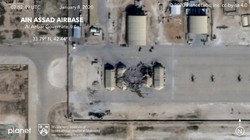 64 American military personnel have now been diagnosed with traumatic brain injury in the wake of the Iranian missile strike on Ein Al-Assad military base in Iraq, while President Donald Trump and his defense officials had initially claimed no service members were injured or killed in Tehran's retaliatory operation.
64 American military personnel have now been diagnosed with traumatic brain injury in the wake of the Iranian missile strike on Ein Al-Assad military base in Iraq, while President Donald Trump and his defense officials had initially claimed no service members were injured or killed in Tehran's retaliatory operation. RNA - Marking the fifth time in three weeks the military has increased its injury assessment, the US Defense Department announced on Thursday night that 64 troops had sustained traumatic brain injuries in the Iranian missile attack launched on January 8 in retaliation for Washington's assassination of Tehran's anti-terror commander.
The 64 service members have been diagnosed with mild traumatic brain injuries, Defense Department Spokesman Lieutenant Colonel Thomas Campbell said in a statement.
Eight are being treated in the United States, while 21 are in Landstuhl, Germany, and 39 have returned to duty in Iraq, according to the Pentagon statement.
Defense Secretary Mark Esper, speaking to reporters during a news conference alongside Chairman of the Joint Chiefs of Staff General Mark Milley, noted on Thursday that the Pentagon took those types of injuries “very seriously”.
Several Pentagon officials had told CNN that the number of diagnosed cases is likely to continue to change, as approximately 200 people who were in the blast zone at the time of the attack have been screened for symptoms.
The department initially said there had been no injuries, but then reported 34 service members had been injured last week, before upping the number to 50.
Meantime, a leading Kuwaiti newspaper had also disclosed that 16 US military men with fatal injuries sustained during Iran's retaliatory operation have been taken to a hospital in camp Arifjan in Ahmed al-Jaber airbase in Kuwait.
The Arabic-language Al-Qabas paper quoted informed sources as saying that the 16 US militaries, included some whose bodies had been severely burnt and some others who had sustained shrapnel wounds, have been transferred to a US military hospital in Kuwait under strict security measures.
It added that the wounded military men have gone under surgical operations and are still kept at the ICU section of the hospital.
According to the paper, several other US forces who had sustained mild injuries in Iran's missile strike are being treated in Iraq.
The US president and the Pentagon initially claimed no service members were killed or wounded, and they signaled that Washington was not looking for additional armed conflict with Tehran. Trump stated soon after the missile attack that “no Americans were harmed", and the United States suffered "no casualties", noting that "all of our soldiers are safe, and only minimal damage was sustained at our military bases".
Later, it emerged that “several” were being treated for concussion symptoms.
Trump has consistently tried to minimize the injuries, stating that he had “heard [the injured soldiers] had headaches” but insisting “it is not very serious…relative to other injuries I have seen”.
The US administration also was criticized for playing down the severity of injuries. The Veterans of Foreign Wars later stated in a statement that it “expects an apology from the president to our service men and women for his misguided remarks”.
Ein Al-Assad, which houses US troops, is one of the largest and oldest military bases and located in Al-Anbar province in Western Iraq. It found itself under fire from volleys of ballistic missiles launched from Iran after a US drone strike near Baghdad on January 3 assassinated Islamic Revolution Guards Corps (IRGC) Qods Force Commander Lieutenant General Qassem Soleimani who played a major role in beating the Islamic State of Iraq and the Levant (ISIL, ISIS or Daesh) terror group in both Syria and Iraq.
The terror group has intensified its attacks in Iraq and Syria following the United States’ assassination of Iran’s top anti-terror commander, residents and monitors say. The Associated Press (AP) announced in an analysis that Daesh “clearly gained at least temporary breathing room” after tensions between Iran and the US escalated in the aftermath of the martyrdom of General Soleimani.
His assassination has inflamed tensions between Washington and Tehran, and drew a harsh rebuke from Baghdad, prompting the Iraqi Parliament to pass a resolution ordering American forces to leave the country.
Briefing media on operational objective of missile attacks on US bases, IRGC Aerospace Commander Brigadier General Ali Hajizadeh stated that Iran was not after killing anyone although "tens of US troops have likely been killed and wounded and were transfered to Israel and Jordan on 9 sorties of C-130 flights".
He noted that had Iran intended to kill the American forces, it could have planned high casualty operations to kill 500 US military men in the first step and 4,000 to 5,000 others in the second and third phases within 48 hours.
Supreme Leader of the Islamic Revolution Ayatollah Seyed Ali Khamenei has called the military operation "only a slap across the face" of the United States, stating that "military moves like this are not enough. The Americans' corruption-stirring presence should come to an end".
Tehran reiterates that its strategic objective is expelling the US troops from the region, naming it the true vengeance for the terror attack on its most popular commander.